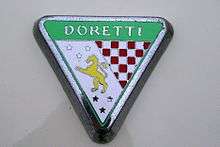Swallow Doretti
| Swallow Doretti | |
|---|---|
.jpg) 1954 open two-seater | |
| Overview | |
| Manufacturer | Swallow a subsidiary of (TI Group) |
| Production | 276 cars[1] 1954-1955 |
| Designer | Frank Rainbow[2] |
| Body and chassis | |
| Body style |
|
| Related |
|
| Powertrain | |
| Engine | 1991 cc Straight-4 |
| Transmission | 4 speed manual. Optional overdrive |
| Dimensions | |
| Wheelbase | |
| Length | 156 in (3,962 mm)[3] |
| Width | 61 in (1,549 mm)[3] |
| Height | 52.5 in (1,334 mm)[3] |
| Kerb weight | 17 cwt, 1,904 lb (864 kg) open two-seater[4] |
| Standard Vanguard | |
|---|---|
| Overview | |
| Manufacturer | Standard Motor Company |
| Also called | Triumph |
| Combustion chamber | |
| Configuration | Straight 4-cylinder[4] |
| Displacement | 1,991 cc (121.5 cu in)[4] |
| Cylinder bore | 83 mm (3.3 in)[4] |
| Piston stroke | 92 mm (3.6 in)[4] |
| Valvetrain | overhead valves[4] |
| Compression ratio | 8.5:1[4] |
| Combustion | |
| Fuel system | twin S.U. carburettors[4] |
| Cooling system | water |
| Output | |
| Power output | 90 bhp (67 kW; 91 PS) @4,800 rpm[4] |
The Swallow Doretti is a two-seater British sports car built on Swallow's own design of box-section tube chassis using Triumph TR2 mechanicals, made between 1954 and 1955. It was intended for the U.S. market and to be a more refined two-seater than available there at that time.
Swallow
The car was built by the Tube Investments Group subsidiary, Swallow Coachbuilding Company (1935) Ltd, bought for its 1935 to 1946 association with Jaguar's prewar motorcycle sidecars. Sometimes known for it looks from the Ferrari 166MM 'Barchetta'
Doretti
The Dorretti name was derived from Dorothy Deen, who managed the Western US distributorship Cal Sales.
Design
Based on the Triumph TR2 it had much improved stability, its track was 3 in (76 mm) wider and its wheelbase 7 in (178 mm) longer. The Doretti had a tubular Reynolds 531 manganese–molybdenum, medium-carbon steel chassis. Reynolds was another member of the T I Group. The double-skinned body had an inner structural skin made of steel and an aluminium outer skin. Most cars were supplied with Laycock-de Normanville electric epicyclic overdrive and they were capable of 100 mph. 276 Mk I cars were made, including a single fixed head coupe version.[1] The car was designed by in-house engineer Frank Rainbow,[2] and produced in the TI factory at The Airport, Walsall, Staffordshire, England.
Three prototype Mk II cars, the Sabre were produced. These had a stiffer chassis and better weight distribution.[1]
The only car that the TI Group ever built under the Swallow name its production stopped in 1955 when the parent company TI Group changed policy. Allegedly, pressure from the British motor industry, most notably Jaguar, led to the cessation of production of the Doretti. It is thought that the directors of TI were pressured in that the production of the Doretti sports car placed TI at an advantage over their customers buying raw materials, creating a conflict of interest.
Performance
A car with overdrive tested by the British magazine The Motor in 1954 had a top speed of 100.2 mph (161.3 km/h) and could accelerate from 0-60 mph (97 km/h) in 12.3 seconds. A fuel consumption of 27.9 miles per imperial gallon (10.1 L/100 km; 23.2 mpg-US) was recorded. The test car cost £1,158 including taxes.[3]
The standard version without overdrive cost £1,102. At the time a Triumph TR2 cost £887.[5]
 Doretti badge |
.jpg) Interior |
See also
References
- 1 2 3 Mike Lawrence, A to Z of Sports Cars, 1945-1990 Bay View Books, Bideford, Devon : 1996 ISBN 1870979818
- 1 2 page 63 Motor Sport (magazine), January 1954, London, Teasdale Pub. Co.
- 1 2 3 4 5 "The Swallow Doretti 2-seater". The Motor. September 15, 1954.
- 1 2 3 4 5 6 7 8 9 10 Culshaw, David; Horrobin, Peter (2013) [1974]. The Complete Catalogue of British Cars 1895 - 1975 (e-book ed.). Poundbury, Dorchester, UK: Veloce Publishing. pp. 44–46. ISBN 978-1-845845-83-4.
- ↑ Robson, G. (2006). A-Z of British Cars 1945-1980. Devon, UK: Herridge Books. ISBN 0-9541063-9-3.
External links
| Wikimedia Commons has media related to Swallow Doretti. |